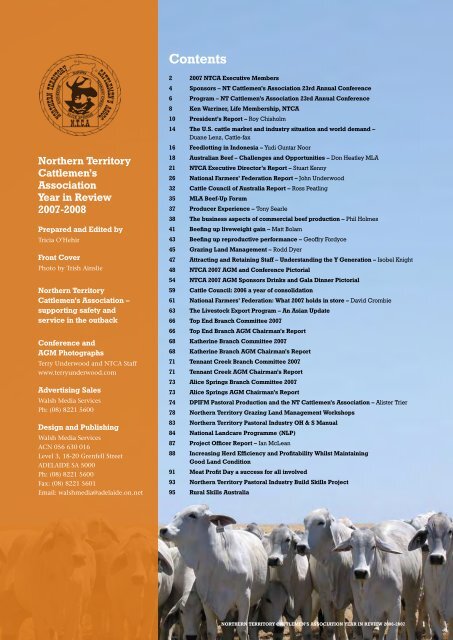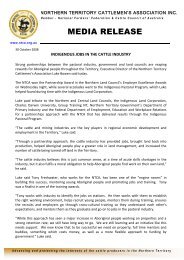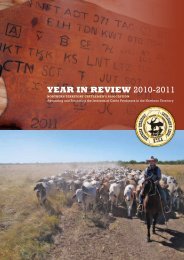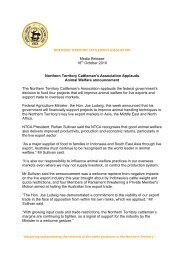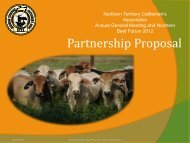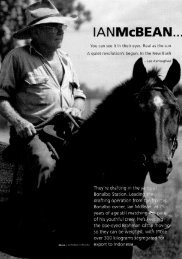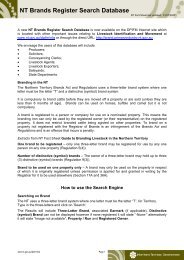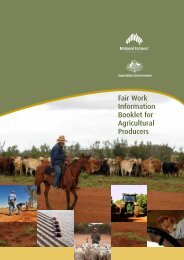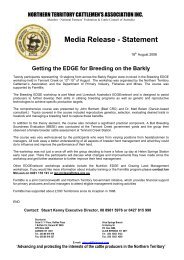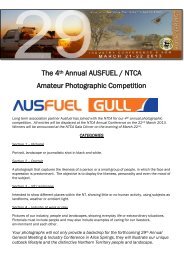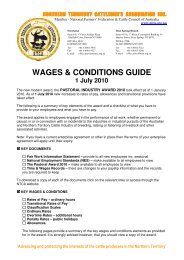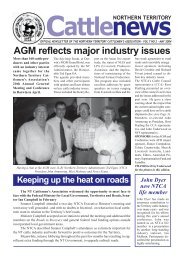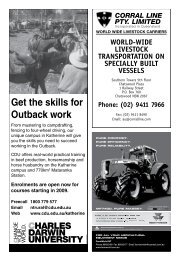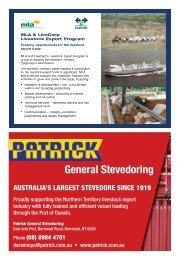2008 NTCA Yearbook - Northern Territory Cattlemen's Association
2008 NTCA Yearbook - Northern Territory Cattlemen's Association
2008 NTCA Yearbook - Northern Territory Cattlemen's Association
Create successful ePaper yourself
Turn your PDF publications into a flip-book with our unique Google optimized e-Paper software.
<strong>Northern</strong> <strong>Territory</strong> Cattlemen’s <strong>Association</strong> IncorporatedAdvancing and Protecting the Interests of Cattle Producers in the <strong>Northern</strong> <strong>Territory</strong>Major SponsorsNT Cattlemen’s <strong>Association</strong> 24th Annual Conference <strong>2008</strong>Dinner Sponsors4<strong>Northern</strong> <strong>Territory</strong> Cattlemen’s <strong>Association</strong> Year in review 2007-<strong>2008</strong>
<strong>Northern</strong> <strong>Territory</strong> Cattlemen’s <strong>Association</strong> IncorporatedAdvancing and Protecting the Interests of Cattle Producers in the <strong>Northern</strong> <strong>Territory</strong>
<strong>Northern</strong> <strong>Territory</strong> Cattlemen’s <strong>Association</strong> IncorporatedAdvancing and Protecting the Interests of Cattle Producers in the <strong>Northern</strong> <strong>Territory</strong>NORTHERN TERRITORYCATTLEMEN’S ASSOCIATIONYEAR BOOK 2004/5NT Cattlemen’s <strong>Association</strong> 24th Annual Conference <strong>2008</strong>From Alice Springs to Darwin, East to West this year’sconference will focus on Beef production in <strong>Northern</strong> Conference Program – Friday March 28th <strong>2008</strong>Australia, it’s place in the world beef market and its7:30am Registration Commencesy Walsh Media future Services opportunities with the and authority threats. of the <strong>Northern</strong> <strong>Territory</strong> Cattlemen’s <strong>Association</strong>8:00am Welcoming AddressADVERTISING PROOFChanging economic conditions, global and domestic, and climatechange are current issues that will affect the Pastoral Industry inthe near future. This year’s conference will address these topicsin depth, examining the how, what and why and their collectiveimpact on the industry and producers.International speakers at the conference will give an insightinto competitors and customers of the <strong>Northern</strong> Beef Industry.The state of the industry and it’s markets will also be discussedwith an emphasis on the future.The conference will be concluded once again with a panel ofindustry leaders and experts discussing and evaluating the futureof the industry and issues it faces.Mr Roy Chisholm,President8:15am Official Opening______________ below is a proof of your advertisement booked in the NT Cattlemens004/5. Please check it thoroughly and fax back to us with your signed approval onld there be any alterations, please contact Helen Lee on (08) 8221 5600.deadlines if confirmation is not received by _______ then approval will be assumed.The Hon. Minister BurkeFederal Minister for Agriculture8:50am Climate Change, a Global PerspectiveDr Brian Fisher9:25am Australian Agriculture and the Global EconomyMr Chris RichardsonAccess Economics10:00am Morning TeaBook Launch: A Field Guide to Plants of theBarkly Region10:3am The Brazilian Beef & Processing IndustryMr Fernando Galletti de Queiroz66 Smith StreetAlice Springs N.T. 0870• WATER AND MINERAL DRILLERS• VERY HIGH PRESSURE AIR FOR DEEP HOLEROTARY PERCUSSION DRILLING• MUD CIRCULATION DRILLING,ALSO AVAILABLE FOR ARTESIAN ANDUNCONSOLIDATED FORMATIONS• PUMP TEST UNITS AVAILABLE• PASTORAL - AGRICULTURAL -TOWN WATER SUPPLIES• STATIGRAPHIC AND MINERAL DRILLINGQUOTES THROUGHOUT AUSTRALIAALICE SPRINGSPh: (08) 8952 2966Fax (08) 8952 7017email: info@goreycole.com.au11:00am Grazing Cattle under Palm Oil PlantationsMr Mohamed Azid Kabul11:30am The On-farm Impact of Climate Change PolicyMr Mick KeoughAustralian Farm Institute12:00pm LunchLaunch: Best Practice Manual for the Katherine Regionand FrontGate website DPIFM12:50pm Session IntroductionMr David PalmerManaging Director MLA1:10pm The Cattle Industry, Ready to Bounce BackMr Peter Weeks, MLA1:30pm Indonesian Opportunities for AustralianLivestock ExportsMr Scott Hansen, MLA1:50pm Strengthening our Domestic MarketMr David Thomason, MLA2:20pm Afternoon Tea2:40pm Panel Session4:40pm Closing AddressThe Hon. Minister NattNT Minister for Primary Industries6CLIENT APPROVAL<strong>Northern</strong> <strong>Territory</strong> Cattlemen’s <strong>Association</strong> Year in review 2007-<strong>2008</strong>
<strong>Northern</strong> <strong>Territory</strong> Cattlemen’s <strong>Association</strong> IncorporatedAdvancing and Protecting the Interests of Cattle Producers in the <strong>Northern</strong> <strong>Territory</strong>Because Michael knowsmy stock as well as who’sgoing to buy them.At Landmark, we pride ourselves on building close business relationships with our clients. It’s all about trust.They know we have access to more markets and can secure better prices thanks to our international partnerships.Landmark gives you the financial security of dealing with a large company with a network of committed expertslike Michael, who have the experience and the knowledge to help you make the most of every opportunity.That’s why more Australian farmers look to us.landmark.com.au
<strong>Northern</strong> <strong>Territory</strong> Cattlemen’s <strong>Association</strong> IncorporatedAdvancing and Protecting the Interests of Cattle Producers in the <strong>Northern</strong> <strong>Territory</strong>Life Membership for Ian McBean - a veterancattleman with 55 years in the industryVeteran cattleman and long-time <strong>NTCA</strong> stalwart IanMcBean has been honored with life membership formore than five decades of unstinting commitment tothe <strong>Northern</strong><strong>Territory</strong> pastoral industry.Ian got his first taste of outback station life in1953 when hearrived in Central Australia from NSW with little more than aswag and a saddle. He was offered a job with Johnny Driver atElkedra, started out as a ringer and drover then worked his wayup through almost every facet of the pastoral industry to endup as one of the <strong>Territory</strong>’s most successful and enduring cattlestation owners.In 1955, Ian went droving with Don and George Booth,taking cattle from Brunette Downs into Queensland. In 1956, hebought their plant and continued droving in his own right. Heinterspersed his droving work with mustering and breaking inhorses on the Barkly and spent some time based across the borderin Camooweal.Ian has served as both Chairman andDeputy Chairman of the <strong>NTCA</strong>’s TopEnd Branch in recent years. He looksback with nostalgia on his old drovingand mustering days but, with 55 yearsof cattle work behind him, he is quitecontent now to enjoy the comforts andconveniences of modern farming lifedown at Bonalbo.A droving job in the early 1960s took him far west into theVRD to bring cattle from Auvergne Station to Queensland – andthis is when life took on a whole new perspective. While on thedroving track, he drew Innesvale Station in a land ballot. Hemoved his horses over from Queensland and built the propertyinto a workable cattle station. He sold Innesvale in the early8<strong>Northern</strong> <strong>Territory</strong> Cattlemen’s <strong>Association</strong> Year in review 2007-<strong>2008</strong>
<strong>Northern</strong> <strong>Territory</strong> Cattlemen’s <strong>Association</strong> IncorporatedAdvancing and Protecting the Interests of Cattle Producers in the <strong>Northern</strong> <strong>Territory</strong>Life Membership for Ian McBean cont.1980s and bought nearby Bradshaw, which he also developedextensively before selling that station to the Defence Departmentin 1996.Ian, wife Kay and their youngest children moved ontoBonalbo Station in the Douglas-Daly and now operate that andother district properties as part of Bonalbo Pastoral Enterprises.Their operations include running a Brahman breeding herd,buying cattle to grow out for the live export trade and growingimproved pasture, which has dramatically lifted theircarrying capacity.Ian has served as both Chairman and Deputy Chairman ofthe <strong>NTCA</strong>’s Top End Branch in recent years. He looks back withnostalgia on his old droving and mustering days but, with 55years of cattle work behind him, he is quite content now toenjoy the comforts and conveniences of modern farming lifedown at Bonalbo.The Mark of QualityQUEENSLANDBEENLEIGH ABATTOIR OFFICE (07) 3287 2188GEOFF TEYS, LIVESTOCK DIRECTOROFFICE (07) 3287 2188 MOBILE 0408 740 022GLENN POOLE, LIVESTOCK MGROFFICE (07) 3382 5134 HOME (07) 5543 3990MOBILE 0408 078 723TOOWOOMBAGARY JOHNSTONHOME (07) 4635 3931 MOBILE 0407 577 491BILOELA/ROMAJAMES BROSNANHOME (07) 4993 1253 MOBILE 0428 931 253NORTHERN NSW MICK BROWNEHOME (02) 6645 4573 MOBILE 0427 225 023BEENLEIGHKEITH ADAMSHOME (07) 5549 <strong>2008</strong> MOBILE 0417 394 304HOW TO MARKET YOUR CATTLEWITH THE AUSTRALIAN COMPANYContact Teys in your districtBILOELA ABATTOIR OFFICE (07) 4992 1888TODD AMOR, LIVESTOCK MGROFFICE (07) 4992 1888 HOME (07) 4992 4680MOBILE 0408 068 643BILOELA/ROMAJAMES BROSNANHOME (07) 4993 1253 MOBILE 0428 931 253ROCKHAMPTON ABATTOIROFFICE (07) 4930 5888MICK THORNTON, LIVESTOCK MGROFFICE (07) 4930 5833 HOME (07) 4927 2733MOBILE 0428 958 124BURNETTBEAU SURAWSKIHOME (07) 4922 3217 MOBILE 0427 686 211CLERMONTDES WHIPPHOME (07) 4983 3911 MOBILE 0427 833 911SARINAMICHEAL YOUNGHOME (07) 4956 4436 MOBILE 0407 375 515LONGREACHPATRICK GAINHOME (07) 4658 0377 MOBILE 0428 441 176MARLBOROUGHMATTHEW NOAKESHOME (07) 4935 6062 MOBILE 0439 356 222NORTH QLDMIKE HARBINHOME (07) 4061 4030 MOBILE 0427 779 308NEW SOUTH WALESNORTHERN RIVERS AND TABLELANDSMICK BROWNE HOME (02) 6645 4573MOBILE 0427 225 023TAMWORTH SINGLETON DUBBOTIM PERRAM HOME (02) 6542 5154MOBILE 0428 730 259The Mark of QualitySOUTH AUSTRALIANARACOORTE ABATTOIR OFFICE (08) 8762 3988DAVID WOOLARD, LIVESTOCK MGROFFICE (08) 8762 3988 HOME (08) 8766 7020MOBILE 0428 832 045NTH VICTORIA & HAMILTONDAVID EAST MOBILE 0427 027 981ADELAIDEPETER JUDDHOME (08) 8388 6202 MOBILE 0418 819 237NORTHERN TERRITORY DES WHIPPHOME (07) 4983 3911 MOBILE 0427 833 911TASMANIADAVID WOOLARD OFFICE (08) 8762 3988HOME (08) 8766 7020 MOBILE 0418 832 045SPEAK TO ANY OF THE BUYERS LISTED FOR YOUR CONTACT1427737Mr/Mrs Rural Producer DipAg DipRBMDid you think letters after your name were only for office workers?Have your skills and knowledge formallyrecognised with a Diploma of Agriculture orDiploma of Rural Business Management atSouthern Queensland Institute of TAFE.TAFE values your whole of life experienceand invites you to apply for Diploma enrolmentusing the guidelines of its innovative and flexibleRecognition of Prior Learning (RPL) process.Those eligible to apply include participants of GrazingLand Management and Grazing for Profit trainingcourses. All other skills and study also assessable.QualificationFull FeeDiploma of Agriculture $1500.00Diploma of Agriculture and Diploma of Rural$2000.00Business Management*Concession rates may apply to Queensland residents.Maxine Thomas phone 07 4620 4200maxine.thomas@deta.qld.gov.auExperienced and Qualified—Perfect!Southern Queensland Institute of TAFE, Roma Campus<strong>Northern</strong> <strong>Territory</strong> Cattlemen’s <strong>Association</strong> Year in review 2007-<strong>2008</strong> 9
<strong>Northern</strong> <strong>Territory</strong> Cattlemen’s <strong>Association</strong> IncorporatedAdvancing and Protecting the Interests of Cattle Producers in the <strong>Northern</strong> <strong>Territory</strong><strong>NTCA</strong> President’s Report<strong>NTCA</strong> Annual Conference <strong>2008</strong>As I wind up my second year as President of thisproud and robust organization, it gives me greatpleasure to report that our industry continues along apath of solid growth. In tune with this trend, the <strong>NTCA</strong>becomes even stronger and more effective in takingour issues to the places where they need to be heardand acted upon.Our strength is in our membership and in the skilled andefficient people we employ to get the job done on our behalf.When we lobby governments on issues of concern we knowthat the whole industry is behind us. The <strong>NTCA</strong> has on itsmembership books the owners and managers of most of the<strong>Territory</strong>’s 216 working pastoral holdings, and of at least 98 percent of the NT’s cattle herd.Our close working relationship with peak national industrygroups such as MLA, Livecorp, and the National FarmersFederation was further strengthened in 2007 and our membersare able to benefit significantly from this solid industry bond.The past year has been one of significant political change atboth local and national levels. We have seen the long-runningLiberal-National government of John Howard ousted frompower and replaced by Kevin Rudd and his new team of Laborministers. We enjoyed an excellent working relationship withformer transport, trade and agriculture ministers, including PeterMcGauran who did much to encourage us to pursue our needsthrough the highest levels in Canberra. We are now nurturing anew relationship with a relative unknown in the new Minister forAgriculture, Forestry and Fisheries, Tony Burke. It is still far tooearly to tell how much support our northern cattle industry willreceive from the upper echelons in Canberra in relation to issueslike drought support, roads funding or animal welfare, but wehave made a good start.In the <strong>Territory</strong>, we have welcomed a former Primary IndustryMinister, Paul Henderson, as the new Chief Minister and alsolook forward to making solid ground in discussing governmentdecisions that impact on our industry and livelihood of ourmembers.State Of The IndustryIn the year just gone, the <strong>Northern</strong> <strong>Territory</strong> pastoral industrymaintained its status as the <strong>Territory</strong>’s third largest GDP earner.The industry is now based on a herd totaling 2.08 million headof cattle. It directly employs 1800 people and operates through216 pastoral properties spread from the Top End wetlands, Gulfdistrict and vast VRD to the Barkly and the often challenging aridred heart of Central Australia.Domestic beef sectorNeed some input here. I don’t have figuresLive exportsThe live export industry remained a robust and crucialcontributor to the <strong>Territory</strong> economy in 2007, and continued toprovide work for hundreds of people in the regional areas. Some45 per cent of the <strong>Territory</strong>’s total annual turn-off of 568,000head of cattle now feeds into the Asian live export trade.A record-breaking 265,000 head of live cattle where shippedthrough the Port of Darwin to South East Asian markets in 2007.The trade generated more than $180 million in export salesalone. The industry turn-over is heading towards $400 milliondirectly, and bolstering the economy in regional areas.The Indonesian market was again the backbone of our livecattle export industry, taking 90 per cent of all cattle raised inthe <strong>Territory</strong> for this sector. Other markets still on the radar forlimited supplies include Malaysia.With the live export sector showing no sign of decline, cattleproducers across <strong>Northern</strong> Australia continue work with industrygroups including MLA and Livecorp t build up domestic andoffshore partnerships and programs to strengthen their standingin an Asian environment of burgeoning consumer demand andmarket growth.The <strong>NTCA</strong> again took advantage of opportunities to joinThe live export industry remaineda robust and crucial contributor tothe <strong>Territory</strong> economy in 2007, andcontinued to provide work for hundredsof people in the regional areas.10<strong>Northern</strong> <strong>Territory</strong> Cattlemen’s <strong>Association</strong> Year in review 2007-<strong>2008</strong>
NEWPS150-C1-2 Solar-panelslow heads, big volumeSOLARWATER PUMPS◆◆◆Sola-Pumpswater filled brushless DC motormaintenance freeno electronics in the motor12-200V DC, 110-240V AC solutions◆ modular concept: pump end, motor,Deliver more water controller at lower costs are seperate parts◆ all 316 stainless steel, not thinnerPS1200Wthan 0.16” (4mm)6-8 Solar-panelsMaxi◆◆◆◆2,000ft (600m) lift abilityPS600Wpump speed 4-6 adjustableSolar-panelsMidiSINCE 1993PS200W2-4 Solar-panelsMiniremote tank shut off with integratedtimer and pressure switchlargest variety in solar industry: helicalrotor, centrifugal, vane-type,submersible, surface or floating pumpAlsoAvailable:Solar PoweredAir-PumpsLORENTZ Germanywww.lorentz.deSole Australian Importer of Lorentz Solar PumpsManufacturer of 5 Star Solar Tracking ArraysPhone: 1300 554 307info@bwsolar.com.auwww.bwsolar.com.au<strong>Northern</strong> <strong>Territory</strong> Agent for Lorentz Solar PumpsPhone: (08) 8953 4728contact@ecoenergy.com.auwww.ecoenergy.com.au
<strong>Northern</strong> <strong>Territory</strong> Cattlemen’s <strong>Association</strong> IncorporatedAdvancing and Protecting the Interests of Cattle Producers in the <strong>Northern</strong> <strong>Territory</strong><strong>NTCA</strong> President’s Report cont.trade delegations into South East Asia, lead by <strong>Northern</strong><strong>Territory</strong> Government Chief Ministers and Ministers andincluding government agency chiefs and key industry players.The <strong>NTCA</strong>’s Executive Director travelled on a number ofNT Government-coordinated trade missions to Indonesia,and emerging new markets including Vietnam, which we areconfident will soon be re-opened as a significant outlet for<strong>Territory</strong> live cattle and buffalo shipped out of Darwin. Duringthe first of two trade missions to Vietnam, the NT Governmentheads signed a Memorandum of Understanding with the Ba Ria-Vung Tau Province, to cover a range of future trade prospectsincluding live cattle exports.The <strong>Territory</strong>’s last live shipment to Vietnam was in 1999-2000and things now look promising that the trade to this importantAsian market can be resumed in the not-too-distant future, onceinfrastructure and health protocols have been sorted out. To get astronghold in this market would be a major boost for Australia’slive exporters. Vietnam has a population of more than 80 millionand an 8 per cent growth rate - one of the region’s highest. Thattranslates to a hell of a lot of consumers to satisfy.Just prior to the Federal election, our association won a$420,000 Australian Government grant to produce a plan toimprove the range of South East Asian markets available to theAustralian cattle industry.In its funding proposal to the Agricultural Minister PeterMcGauran, our association outlined a strategy to find newmarkets by building on the present success of the live cattleexport trade through the Port of Darwin to Indonesia andMalaysia.The grant was one of eight distributed through a $1.5million package for Australian primary industry projects andwas designed to help the industries become more profitable andsustainable by putting strategies in place to address significantissues, and capitalising on future growth opportunities in bothdomestic and international markets.Industry Issues In 2007-08Key issues for our <strong>NTCA</strong> membership over the past year haveincluded drought relief, local government reforms, pastoral landvaluations, the ill-considered extension of the Douglas-Daly landclearing moratorium, feral animal control and the potentiallydisastrous anti live export stance of animal rights lobbyists.DroughtThe ongoing drought conditions across large pockets ofCentral Australia continued to seriously hamper operationson at least 30 pastoral properties - but the worst affected landownersdid have a major break-through after the <strong>NTCA</strong> pressedformer Australian Agriculture Minister Peter McGauran for urgentdrought assistance.We presented Minister McGauran with a comprehensiveExceptional Circumstances (EC) Drought Application preparedover many months by the <strong>NTCA</strong> and the NT Department ofPrimary Industry, Fisheries and Mines.His decision to approve the application has enabled affected<strong>Northern</strong> <strong>Territory</strong> properties to receive the same level ofAustralian Government Exceptional Circumstance assistance asproperties in NSW, Queensland, Victoria and South Australia.Later in the year, we had cause to applaud the AustralianGovernment again when it committed a further $714 millionin urgent drought aid for struggling farmers and also lifted thethresholds for assistance through the EC package. This has meantthat the $473,000 threshold for off-farm assets was lifted to a farmore reasonable $750,000, thereby significantly broadening thescope for eligibility for acceptance into the EC package.Local Government ReformsLocal government reforms have remained the most criticaland hotly debated issue for our members since our last annualconference - and I’m disappointed to report that we still have abattle on our hands in getting the government to be more honestand open on their intentions.The current Labor Government is hell-bent on ploughingthrough with its aggressive campaign to inflict sweepingboundary changes and local government reforms on regionaland bush councils. We have argued from the start that thegovernment’s handling of this sorry saga has demonstrated anappalling lack of understanding of how regional industry works.Along with other peak industry groups, we maintain ourstrong objection to the government’s ridiculous 18-monthtimeframe for change, and will continue to lobby relentlesslyuntil commonsense prevails.Chief Minister Henderson recently moved to back-track onthe proposed merger of four Top End shires, including Litchfield,in the wake of intensive pressure from hundreds of irate Top Endlandholders, lead by Independent Nelson MLA Gerry Wood.But apart from a short delay to pushing the reform legislationthrough Parliament, he is pushing ahead with plans to mergescores of regional councils into eight super shires, claiming thereis strong support for the reforms across the <strong>Territory</strong>.Our new Chief Minister is deluding himself if he thinks ourmembers and those of other <strong>Northern</strong> <strong>Territory</strong> industry andbusiness groups support these rushed and ill-considered reforms.We will be making sure he gets that message loud and clear.Despite our intensive lobbying and representations, we arestill waiting for some straight answers about how the reformswill work and the impacts on members. Until the whole thing ishandled transparently and all stakeholders understand exactlywhat will happen, it’s irresponsible to proceed.The recent LGANT Paper released to explain the proposed12<strong>Northern</strong> <strong>Territory</strong> Cattlemen’s <strong>Association</strong> Year in review 2007-<strong>2008</strong>
<strong>Northern</strong> <strong>Territory</strong> Cattlemen’s <strong>Association</strong> IncorporatedAdvancing and Protecting the Interests of Cattle Producers in the <strong>Northern</strong> <strong>Territory</strong><strong>NTCA</strong> President’s Report cont.trade delegations into South East Asia, lead by <strong>Northern</strong> <strong>Territory</strong>Government Chief Ministers and Ministers and includinggovernment agency chiefs and key industry players.The <strong>NTCA</strong>’s Executive Director travelled on a number ofNT Government-coordinated trade missions to Indonesia,and emerging new markets including Vietnam, which we areconfident will soon be re-opened as a significant outlet for<strong>Territory</strong> live cattle and buffalo shipped out of Darwin. Duringthe first of two trade missions to Vietnam, the NT Governmentheads signed a Memorandum of Understanding with the Ba Ria-Vung Tau Province, to cover a range of future trade prospectsincluding live cattle exports.The <strong>Territory</strong>’s last live shipment to Vietnam was in 1999-2000and things now look promising that the trade to this importantAsian market can be resumed in the not-too-distant future, onceinfrastructure and health protocols have been sorted out. To get astronghold in this market would be a major boost for Australia’slive exporters. Vietnam has a population of more than 80 millionand an 8 per cent growth rate - one of the region’s highest. Thattranslates to a hell of a lot of consumers to satisfy.Just prior to the Federal election, our association won a$420,000 Australian Government grant to produce a plan toimprove the range of South East Asian markets available to theAustralian cattle industry.In its funding proposal to the Agricultural Minister PeterMcGauran, our association outlined a strategy to find newmarkets by building on the present success of the live cattleexport trade through the Port of Darwin to Indonesia andMalaysia.The grant was one of eight distributed through a $1.5million package for Australian primary industry projects andwas designed to help the industries become more profitable andsustainable by putting strategies in place to address significantissues, and capitalising on future growth opportunities in bothdomestic and international markets.Industry Issues In 2007-08Key issues for our <strong>NTCA</strong> membership over the past year haveincluded drought relief, local government reforms, pastoral landvaluations, the ill-considered extension of the Douglas-Daly landclearing moratorium, feral animal control and the potentiallydisastrous anti live export stance of animal rights lobbyists.DroughtThe ongoing drought conditions across large pockets ofCentral Australia continued to seriously hamper operationson at least 30 pastoral properties - but the worst affected landownersdid have a major break-through after the <strong>NTCA</strong> pressedformer Australian Agriculture Minister Peter McGauran for urgentdrought assistance.We presented Minister McGauran with a comprehensiveExceptional Circumstances (EC) Drought Application preparedover many months by the <strong>NTCA</strong> and the NT Department ofPrimary Industry, Fisheries and Mines.His decision to approve the application has enabled affected<strong>Northern</strong> <strong>Territory</strong> properties to receive the same level ofAustralian Government Exceptional Circumstance assistance asproperties in NSW, Queensland, Victoria and South Australia.Later in the year, we had cause to applaud the AustralianGovernment again when it committed a further $714 millionin urgent drought aid for struggling farmers and also lifted thethresholds for assistance through the EC package. This has meantthat the $473,000 threshold for off-farm assets was lifted to a farmore reasonable $750,000, thereby significantly broadening thescope for eligibility for acceptance into the EC package.Local Government ReformsLocal government reforms have remained the most criticaland hotly debated issue for our members since our last annualconference - and I’m disappointed to report that we still have abattle on our hands in getting the government to be more honestand open on their intentions.The current Labor Government is hell-bent on ploughingthrough with its aggressive campaign to inflict sweepingboundary changes and local government reforms on regionaland bush councils. We have argued from the start that thegovernment’s handling of this sorry saga has demonstrated anappalling lack of understanding of how regional industry works.Along with other peak industry groups, we maintain ourstrong objection to the government’s ridiculous 18-monthtimeframe for change, and will continue to lobby relentlesslyuntil commonsense prevails.Chief Minister Henderson recently moved to back-track onthe proposed merger of four Top End shires, including Litchfield,in the wake of intensive pressure from hundreds of irate Top Endlandholders, lead by Independent Nelson MLA Gerry Wood.But apart from a short delay to pushing the reform legislationthrough Parliament, he is pushing ahead with plans to mergescores of regional councils into eight super shires, claiming thereis strong support for the reforms across the <strong>Territory</strong>.Our new Chief Minister is deluding himself if he thinks ourmembers and those of other <strong>Northern</strong> <strong>Territory</strong> industry andbusiness groups support these rushed and ill-considered reforms.We will be making sure he gets that message loud and clear.Despite our intensive lobbying and representations, we arestill waiting for some straight answers about how the reformswill work and the impacts on members. Until the whole thing ishandled transparently and all stakeholders understand exactlywhat will happen, it’s irresponsible to proceed.The recent LGANT Paper released to explain the proposed<strong>Northern</strong> <strong>Territory</strong> Cattlemen’s <strong>Association</strong> Year in review 2007-<strong>2008</strong> 13
<strong>Northern</strong> <strong>Territory</strong> Cattlemen’s <strong>Association</strong> IncorporatedAdvancing and Protecting the Interests of Cattle Producers in the <strong>Northern</strong> <strong>Territory</strong><strong>NTCA</strong> President’s Report cont.reforms raised more questions and concerns than it answers.It is a grossly flawed and inept document demonstratinginconsistencies, hypocrisy and inefficiencies in advocatingmeasures that can only harm the <strong>Territory</strong> economy and viabilityof the proposed new shires.The position put by LGANT is inequitable for the pastoralindustry, delivers little if any benefits to pastoralists in return fortheir taxes, misrepresents ability-to-pay, and is inefficient in thatit will clearly lead to perverse incentives.There has been no economic and financial analysis providedto demonstrate the economics of the new arrangements. Theonly thing that is clear so far is that the reforms in their presentstate will harm key industry sectors that prop up the NT economyand, in particular, will result in higher costs and likely reducedservices to business.Regional businesses will bear the burden of generatingrevenue for the newly created shires in the absence of any othersignificant rate base. Town and city businesses will also suffer raterises because government funding will not increase and will haveto be spread across the entire NT.Pastoral Land ValuationsAnother major issue to emerge during the year was the NTGovernment’s new valuation methodology relating to <strong>Territory</strong>pastoral properties. We have since argued with the governmentthat the Valuer-General’s methodology, in setting the 2007pastoral lease valuations at levels massively higher that those of2003, was seriously flawed.Our strong lobbying has resulted in 85% of affected propertieshaving the original valuation figure drastically reduced. Wecontinue to fight for the other 15% of property owners still facingexorbitant new lease fees. We have lodged a second objection onbehalf of this group and are still awaiting a response from thegovernment and Valuer-General.In 1992, our industry worked in conjunction with thegovernment to create the base methodology that woulddetermine the Unimproved Carrying Capacity on each pastorallease. It was agreed this information would set the initial valuefor each pastoral lease.The recent increase in sale prices of pastoral leases is a directresult of increased demand for quality pastoral land, mostly frominterstate. There is no correlation between increased values ofpastoral land and the earning capacity/profitability of that land.We argue that the method for determining pastoral leaserentals must be separated from UCV on an ongoing basis andreplaced with a methodology that more accurately reflects thecurrent NT pastoral industry.Environmental IssuesDouglas-Daly land clearing moratorium extendedThe NT Government dropped another bombshell recently byruling that the current four-year land clearing moratorium overthe Douglas-Daly farming district would be extended for anothertwo years. In doing so, it has bowed to pressure from ill-informedinterest groups who claim that the effects of clearing couldpotentially impact on the river ecosystem.The government’s decision ignores the recommendation of thegovernment’s own appointed Daly River Management AdvisoryCommittee that sustainable development be allowed to proceedunder stringent guidelines. That recommendation followedextensive research and consultation with stakeholders, which hasobviously held no sway with the NT Government.The Douglas-Daly is the Top End’s richest agricultural precinctand is vital staging ground for cattle moving from the VRDand Barkly on their way to export through Darwin. Our districtmembers have been desperate to open up additional land -comprising less than 1% of the entire Daly River basin - so theycan position their export cattle, fodder production and mixedfarming operations for future industry growth but they haveagain been left bitterly disappointed and with no room to move.Feral AnimalsFeral animals continue to be a major concern for <strong>Northern</strong><strong>Territory</strong> pastoralists, with wild dogs, horses, donkeys and camelsall still having a severe impact on our stock and land resources.The wild dogs issue received prominent media attention lastyear as passions boiled over on the impact on cattle and people’sinability to do anything to stop it. Deaths among our cattleherds resulting from wild dog attacks are escalating and calls tothe government to change legislation to deal with the problemcontinue to fall on deaf ears. We won’t give up on this.Our members estimate that 3500 to 4500 head of cattleare killed or maimed by wild dogs every year. The impact isparticularly fierce during dry or drought conditions when thesestarving packs inflict millions of dollars worth of damage onpastoral properties.The <strong>NTCA</strong> argues that bait laying and the implementationof other control measures should be based on sensible riskassessment.Our association also believes the NT Government should takea sensible control approach by allowing producers to protect theirlivelihood from cruel and vicious wild dog attacks on aged cattle,cows and vulnerable young calves.If the NT Government is serious about protecting the genepool of the dingo it must follow the example of the otherstates in Australia and allow us to use new technologies such asDoggone baits to control the wild dog problem.Free-ranging feral camels, in herds totalling more than amillion animals at last count, also continue to wreak havoc14<strong>Northern</strong> <strong>Territory</strong> Cattlemen’s <strong>Association</strong> Year in review 2007-<strong>2008</strong>
<strong>Northern</strong> <strong>Territory</strong> Cattlemen’s <strong>Association</strong> IncorporatedAdvancing and Protecting the Interests of Cattle Producers in the <strong>Northern</strong> <strong>Territory</strong>Port of Darwin.Australia’s norther n gatewayfor cattle exports.Live cattle exports are an importantpart of the <strong>Northern</strong> <strong>Territory</strong>'s -and Australia's - agriculturaleconomy, and the Port of Darwinis perfectly geared to handlearound 50% of the nation'slivestock exports.With its multi-modal facilities anddeep water berths, the Port ofDarwin boasts more than 25 yearslive export experience and currentlyholds the world record for havingloaded 22,184 head of cattle on asingle vessel.Darwin’s proximity to Australia’sbeef producers and to growingconsumer markets such as Indonesiamake it the obvious choice. Cattlespend less time in transit both onland and at sea which is vital tomaintaining superior quality.The Port of Darwin is extremelywell served by AQIS and highlytrainedstevedores who understandthe value of animal welfare.So, when it comes to exporting livecattle, quickly and efficiently, putyour trust in the Port of Darwin.Darwin Port CorporationGPO Box 390,DARWIN NT 0801 AustraliaPhone: (+61) 8 8922 0660Fax: (+61) 8 8922 0666Email: darwinport@nt.gov.auor visit our website atwww.darwinport.nt.gov.auDPC2607
<strong>Northern</strong> <strong>Territory</strong> Cattlemen’s <strong>Association</strong> IncorporatedAdvancing and Protecting the Interests of Cattle Producers in the <strong>Northern</strong> <strong>Territory</strong>Changing AttitudesAddress by Australian Minister for Agriculture, Fisheriesand Forestry, the Hon. Tony Burke (abridged)<strong>NTCA</strong> Annual Conference <strong>2008</strong>Within a few days of being sworn in, Kevin Rudddecided that he and I were going to visit Matt andAnna Ahern’s Angus stud out at Roma. I remember thefrustrated journalists complaining that, “There’s justno good shots”. And I said, “Why are they not goodshots?” I’d only been in the job a little while and wasstarting to take it personally. Some responded,“Oh, the ground’s too wet. We like to see that it’sdusty. We like to see that it’s tough.”There’s a strong mindset generally amongst the Australiancommunity that if it’s an optimistic story, it’s not an agriculturalstory. If it’s a story of hope and times looking up, or of promisingeconomic opportunity, then it mustn’t have anything to do withagriculture. It’s an attitude that, after seven years of drought, hasbecome very much entrenched and of itself, I think, a threat.We don’t encourage young people to a sector if we keeptalking it down. We don’t encourage investment in a sector ifwe pretend that it’s got less economic opportunity than what’sactually there. And it’s important, when you’re conductingdealings with your customers overseas that, with the full supportof the Australian people and Australian Government, you areable to talk-up the full level of optimism, of long-term contracts,economic opportunities and high quality product that we areable to deliver.Future challengesTwo key challenges – climate change and a shrinking world – willframe much of the policy the Government brings forward inmaking sure that agriculture is well set-up for the future.There will not be a FarmBis program after 1 July <strong>2008</strong> - butthere will be a $130 million, four-year program called Australia’sFarming Future. This will have three parts – one worth $15million to do with R&D and productivity research, another worth$55 million for climate change adjustment programs, and thebiggest worth $60 million which will be the Climate ChangeAdaptation Partnership Program. Any training program within aclimate change future-focused framework will be eligible to applyfor that. So will there still be on-ground training of farmers?Absolutely. Will the sorts of FarmBis programs that you’ve seenin the past – where you can argue probably close to a majorityof them were dealing quite squarely with some of the challengesthat come to us with climate change? Yes, that will still be there.Some FarmBis programs will no longer be funded.But nobody for a minute should think that the concept ofproviding on-farm training is going to take a back seat. It’s not. Itwill be picked up in a program called Climate Change AdaptationPartnerships. The Caring for our Country Program also dealswith climate change. One issue I’ve had raised many times isthe frustration of people who are doing good land managementprojects, who in order to get the money have to apply to NHT,put in a separate application to Landcare and a third applicationmaybe direct to the local Catchment Management Authority,and you end up for the same project having three separateapplications that cross over different parts of it, each of whichhave a completely different counting mechanism of paperworkthat you then have to feed back to justify the grant for theLandcare project.I’m interested in Government supporting your work as landmanagers and as Australian producers. I’m not interested inwasting your day on form-filling. While we’ve kept the separateappropriation of those different programs, we have streamlinedthe form-filling so you have a single application process throughto Caring for our Country. That money should then be allocatedthrough a different section of Caring for our Country – be it NHT,be it Landcare – so the bureaucratic paper is our problem, not yours.Reviewing Exceptional Circumstances (EC)The NFF has been calling for a long time for a review and lookingat how we can work on drought preparedness better, and it’s takensome time to find Members of Parliament who can go forward,and there’s a political risk in it – if you stick your neck out, it’s aneasy whack whenever you’re reviewing something as sensitive asdrought policy when people are going through tough times.But what happens if we change nothing is an unthinkableoutcome. If we’ve then got policy settings that are all aboutproviding assistance for people in one-in-twenty-, one-in-twentyfive-yearperiods, and a severe drought is unlikely to be viewed asan event that rare – that’s one of the things that climate changehas brought us.So in any review, we’ve started with the first principle. Andthat is that anyone currently on EC assistance is quarantined.No rules change under them while they’re in an EC-declaredsituation. I met with the State and <strong>Territory</strong> Ministers up in16<strong>Northern</strong> <strong>Territory</strong> Cattlemen’s <strong>Association</strong> Year in review 2007-<strong>2008</strong>
<strong>Northern</strong> <strong>Territory</strong> Cattlemen’s <strong>Association</strong> IncorporatedAdvancing and Protecting the Interests of Cattle Producers in the <strong>Northern</strong> <strong>Territory</strong>
<strong>Northern</strong> <strong>Territory</strong> Cattlemen’s <strong>Association</strong> IncorporatedAdvancing and Protecting the Interests of Cattle Producers in the <strong>Northern</strong> <strong>Territory</strong>Official Opening cont.Cairns a few months ago, and we’ll be meeting again at theMinisterial Council in April – and working out exactly how wemake that review go forward.It won’t just be looking at the weather patterns and how wecan better gear Government assistance to match what the futureweather’s likely to be, but also making sure we look at the socialimpacts. Nobody can have a position of leadership in agriculturalpolitics without being painfully aware of some of the mentalhealth and suicide rate issues that have been out there duringsome of the toughest times in the country. And those issues – thatsocial policy – has to form part of the reviews that we go forwardon. Nobody should feel the slightest bit insecure about the rulesbeing changed from under them – they won’t be.Animal welfare issuesThere’s a couple of issues relevant to this room but not to everysection of agriculture. Can I start by letting you know whathappened when – on a fairly emotional day for a young politician– we’re in the big white car with my wife Cathy and kids, on ourway to Yarralumla to get sworn in as a Minister – and she says,“Remember the day when we were watching Sky News and JohnHoward called the election, this was the driveway he went down.”And my eldest daughter said, “But where are the protesters?”because she remembered watching TV that morning. And upahead, I realised there was one, a human being dressed as a sheep,holding up a sign to end live exports. And so the one demo wehad on the day we were being sworn in was about me. Two scarecampaigns had a run last year. The first alleged that you could nothave reasonable animal welfare standards if you were involvedin live exports. The second effectively said you would not havea live export trade if you had a Labor Government. Both werefundamentally wrong.I’ll deal with the second one first because that’s about melosing my job. I’ve said it in every media interview when I’vebeen asked and I’ve said it face-to-face to some of the animalrights people when they come to me. And when they email me,they get the same response back. But I haven’t said it to all ofyou, and I want you to be in absolutely no doubt.Anybody who is any activist around the world who is lookingfor somebody to threaten, talk down, and shut down, in thisindustry, I say to them simply: Don’t look at me. You havesupport from the Australian Government. You had support fromthe previous side of politics. You’ve got support from my side ofpolitics. For every word that you might have heard during thecourse of the last year, to be in some way afraid for the future ofthe industry if there was a change of government – there now hasbeen a change and you will continue to have the support of theAustralian Government.The other fear campaign is based on a concept not applied toanything else in public policy, and that is that if you can find anexample of things going badly wrong, you have to shut down anindustry in total. That’s essentially the argument. We would notapply that argument to any other industry and I don’t see anylogic as to why we’d apply it to this one. And I certainly won’t.I’ve said, and continue to say, that we need to make surewe are leading world’s best practice. I originally thought it wasenough to say we were ‘meeting’ world’s best practice, but after afew dinners, meetings and conversations with Stuart and others,it was made painfully clear to me that we don’t just meet world’sbest practice – we lead it.Animal welfare standards end up better in a whole lot ofdestination countries because of the Australian industry’sinvolvement. That’s the truth of it. It’s an issue that the rest ofthe country, in large parts, still does not understand. I see it asmy role to help you get that message out – and we’ve got to makesure we’re continuing to push the envelope on that.That’s why recently I approved five separate projects worth$450,000 in total, to further improve animal welfare practices inimporting countries in the Middle East, North Africa and Asia. Thoseprojects include infrastructure upgrades in three abattoirs in Libya;upgrades in unloading facilities in ports, feedlots and abattoirsin Oman, Israel, Bahrain and Qatar; another project involvingeducation material to help train handlers to humanely manageAustralian animals in the Middle East and North African regions.Too many people don’t understand the good news story ofwhat this industry has done – not only in terms of jobs, not onlyin terms of dollars for the Australian economy, not only in termsof all the knock-on opportunities for people, particularly in the<strong>Territory</strong>, but what is actually done in terms of improving animalwelfare standards in destination countries.It’s huge – and a story that’s not told nearly enough. And Icertainly view it as my job as Minister to be helping you to tellthat story.Quarantine and biosecurityThe final area where you end up with your climate change issuesand your shrinking world issues coinciding and linking up iswith respect to quarantine and biosecurity. When we talk aboutclimate change we usually talk about three things instead of four.We normally talk about warmer temperatures, less water, moremajor weather events.What we keep forgetting is that climate change also necessarilyinvolves increases in weeds, pests and disease. That comes withthe warmer temperatures. Quarantine and biosecurity have alwaysbeen important. There’s been two examples in recent months thathave caused significant and understandable alarm. One is equineinfluenza and the other is babesiosis virus over in New Caledonia.Each case reinforces the message of what goes wrong if ourbiosecurity is not up to scratch. The unique advantage we have,because of our isolation as a nation, in being able to guarantee18 <strong>Northern</strong> <strong>Territory</strong> Cattlemen’s <strong>Association</strong> Year in review 2006-2007
<strong>Northern</strong> <strong>Territory</strong> Cattlemen’s <strong>Association</strong> IncorporatedAdvancing and Protecting the Interests of Cattle Producers in the <strong>Northern</strong> <strong>Territory</strong>I’ve said, and continue to say, that we need to make sure we are leading world’s bestpractice. I originally thought it was enough to say we were ‘meeting’ world’s bestpractice, but after a few dinners, meetings and conversations with Stuart and others, itwas made painfully clear to me that we don’t just meet world’s best practice – we lead it.<strong>Northern</strong> <strong>Territory</strong> Cattlemen’s <strong>Association</strong>food safety in ways that the rest of the world can’t – but all of thatbeing contingent on continued, strong biosecurity.I’ll get the report back soon from Justice Callinan regardingequine influenza, but I’ve also commissioned my own widerangingreview, not just looking at the single outbreak, but intotal at our quarantine and biosecurity arrangements to makesure they’re sufficiently robust. That review is being conductedby Roger Beale. I’d encourage you to be involved in that process.It’s the first time since the Nairn Review in 1995 that we’veactually had a wide-ranging review of our biosecurity systems. It’sessential to make sure we get this right. There’s too much at stake– not only in terms of the immediate impact on any industry,but on our reputation of being able to provide, uniquely in theworld, the best quality with the best food safety standards, andthat’s why we’ll be going through that. And I understand thatyou only have to be anywhere in the north of the country to becompletely in-tune with how fragile it can be, making sure thatour biosecurity system’s sufficiently robust.After I drove past the human sheep with my family and madeour way into Yarralumla, we all swore an oath. And the oath thatwe swore wasn’t just to the people of Australia. It was to Australia‘the land and its people’.Not many countries do that. But that’s how we do it here –making sure that the land is there for years to come, for what itsays to us all about our national character, for what the land andit being well-managed says to us all for future generations aboutthe productive capacity of the land, and the optimism that you<strong>Yearbook</strong> 2006/2007all have for your businesses for many years to come.All of that comes down to the heart of what I see as my job.I’ve got to tell you – I love this job – I’ve absolutely loved it fromthe moment I was given it. I get to spend my days in the bestparts of the country. I get to spend my days with the best peoplein the country. I get to spend my days dealing with the industriesthat have been talked down for too long, that actually have atremendous optimistic good news story to sell.And the great thing about the two challenges that I’ve spentmy speech talking about this morning – of climate change anda shrinking world – they’re challenges that affect every nationon this planet, and what that means is, the countries that getin front of the game, the countries that do the adjustment andthe investment and get organised early will be the countries thatthrive and get ahead of the pack. I’m determined to see that weare one of those countries. I know from the business sense andacumen of the people in here that this is one part of Australianagriculture that is going to be able to be there absolutely on thefront-line.There’s going to be tough work to do. There’s going to becareful policy settings to make sure we get it right. But at the end,the optimism that you know is going to be made pretty obvious –not just to the rest of the nation, but to the rest of the world.OFFICIAL PUBLICATION OF THE NORTHERN TERRITORY CATTLEMEN’S ASSOCIATIONThe Hon. Tony BurkeAustralian Minister for Agriculture, Fisheries and Forestry28th March <strong>2008</strong>IVSINTEGRATEDVALUATIONSERVICES (NT)IVS is able to offer a full range of commercial industrial andresidential valuation services, specialising in pastoral, agriculturaland rural valuations in the <strong>Northern</strong> <strong>Territory</strong>, Western Australia,Western Queensland and <strong>Northern</strong> South Australia.2/78 Hartley StreetAlice SpringsPh 08 8952 7368Fax 08 8952 075513/82 Wood StreetDarwin CityPh 08 8942 0744Fax 08 8942 0755Email ross@ivsasp.com<strong>Northern</strong> <strong>Territory</strong> Cattlemen’s <strong>Association</strong> Year in review 2007-<strong>2008</strong> 19
Phone (08) 8983 3688Fax (08) 8983 3699Email: ntrealty@bigpond.com.auwww.ntrealty.com.auShop 3/465 Stuart Highway, Collalinga NT 0835PO Box 1357, Howard Springs NT 0835URGENT!!CATTLE STATIONS REQUIREDTO MEET MARKET DEMAND• Cleaning Sale Auctions• Property & Livestock Sales Combined• Marketing Packages for All BudgetsLicensed Real Estate Stock & StationAgents & Auctioneers / Members REINT<strong>Northern</strong> <strong>Territory</strong> Cattlemen’s <strong>Association</strong>SELLING THE TERRITORY!<strong>Yearbook</strong> 2006/20072007/<strong>2008</strong>OFFICIAL PUBLICATION OF OF THE THE NORTHERN TERRITORY CATTLEMEN’S ASSOCIATIONCALL FOR FREE MARKET APPRAISAL!Gunter Trnka 0405 504 770
<strong>Northern</strong> <strong>Territory</strong> Cattlemen’s <strong>Association</strong> IncorporatedAdvancing and Protecting the Interests of Cattle Producers in the <strong>Northern</strong> <strong>Territory</strong>Climate Change, a Global Perspective<strong>NTCA</strong> Annual Conference <strong>2008</strong>Global greenhouse gas emissions are expectedto grow substantially over coming decades, alongwith a continued reliance on fossil fuels. A growingbody of evidence suggests that if dangerous climatechange is to be averted, substantial action mustbe taken to reduce global emissions. However,despite many years of negotiations under the UnitedNations Framework Convention on Climate Change(UNFCCC) and the Kyoto Protocol, the internationalcommunity is a long way from achieving a globalframework that will make the required mitigationinroads over the next few decades.This is largely because of the vast differences in nationalcircumstances, not only between developed and developingcountries, but also between OECD countries. There has also beena presumption that international emissions trading is the policyinstrument of choice, given its acceptance as part of the KyotoProtocol. However, trading will only be effective with propercompliance and governance regimes in place. Such regimesclearly do not exist throughout Annex I countries, let alone moregenerally across the world.APEC Leaders, meeting in Sydney recently, moved to workconstructively toward a comprehensive post-2012 agreement,but it is clear that a global regime will not be in place in thenext 20 years. In the near term, climate change policy willbe characterised by country and regional agreements. Theeffectiveness of Australia’s planned domestic emissions tradingscheme will depend on its design features, but ultimately thereversal of the growth in global greenhouse gas emissions willneed new energy technology to be adopted on an unprecedentedscale. This will require not only a policy shift in developedcountries, but participation by developing countries in a waythat accommodates their aspirations for economic growth andaddresses concerns about energy security and local pollution.The political realities of the climate issue are such that acoordinated, global, market-based approach to greenhouse policyis unlikely to involve key developing countries such as Chinaand India for decades to come. As such, a more regionalised,piecemeal approach to climate policy is likely to evolve inthe face of increasing public pressure. The early stages of thishave already been seen emerging by way of the EU emissionstrading scheme and various US state-based targets and proposedinitiatives, as well as the agreement on both sides of federalpolitics that Australia will introduce a domestic emissions tradingscheme before the end of the first Kyoto commitment period.In the face of this evolving political reality, reversing Australia’sdecision not to ratify the Kyoto Protocol would seem an errorof judgement and run counter to Australia’s economic interests.Environmentally speaking, Australia’s ratification of Kyoto wouldhave, at best, nil effect on global emissions and at worst, result inemissions leakage to developing countries that could exacerbateclimate change.Dr Brian Fisher, Vice PresidentBrian Fisher joined CRA International in October 2006. Priorto this he was Executive Director of the Australian Bureau ofAgricultural and Resource Economics (ABARE). He was firstappointed Executive Director of ABARE in 1988. Brian left theBureau briefly for a senior position in the Federal Departmentof Primary Industries and Energy before returning to ABARE asExecutive Director in 1995.Prior to heading up ABARE, Brian was Professor of AgriculturalEconomics at the University of Sydney and became Dean of theFaculty of Agriculture at the University in 1987. He was appointedAdjunct Professor of Sustainable Resources Development in 2003.Concurrently with his position at ABARE, in 1993 Brian wasappointed one of the experts completing the socioeconomicassessment of climate change for the United Nation’sIntergovernmental Panel on Climate Change (IPCC) SecondAssessment Report. He played an integral role in the internationalclimate change negotiations as economic adviser to Australia’snegotiating team in the lead up to, and at, the third Conferenceof the Parties in Kyoto. He again fulfilled that role at the fourth,fifth and sixth Conferences of the Parties of the UNFCCC andwas engaged as one of the experts completing the IPCC’s ThirdAssessment Report. Brian is currently a convening lead author forthe Fourth Assessment Report.Dr Fisher has been the government board member on anumber of statutory corporations and has published over 250papers and monographs. In addition to his position with ABAREhe was recently an Associate Commissioner of the ProductivityCommission and the Chairman of the Prime Minister’s Exportsand Infrastructure Taskforce. He received the Farrer MemorialMedal in August 1994, became a fellow of the Academy of SocialSciences in Australia in November 1995and was awarded the Public Service Medalin 2002. In 2007, he was appointed anOfficer of the Order of Australia for serviceto agricultural economics, internationaltrade and climate change through researchand public policy analysis. He holds aPhD in agricultural economics from theUniversity of Sydney.In the near term, climate change policywill be characterised by country andregional agreements.<strong>Northern</strong> <strong>Territory</strong> Cattlemen’s <strong>Association</strong> Year in review 2007-<strong>2008</strong> 21
<strong>Northern</strong> <strong>Territory</strong> Cattlemen’s <strong>Association</strong> IncorporatedAdvancing and Protecting the Interests of Cattle Producers in the <strong>Northern</strong> <strong>Territory</strong>UNIQUEDARWIN CITYWATERFRONTAPARTMENTSrepresenting darwin’s bold new futureand one of the biggest transformationsthe city has ever seenmagnificent waterfront living:1, 2 & 3 bedroom apartmentsboutique retail and commercial spacesincluding alfresco restaurantshotels & state-of-the-art convention centresheltered seafront promenadeswith public artwave lagoon, beach & recreationalboating lagoonperforming arts space & lush parklandsREGISTER YOUR INTEREST NOWTel: (08) 8942 3661 / 1300 733 288 info@darwincitywaterfront.com.auThese illustrations are artistic impressions and interpretations and are subject to change. They illustrate a staged developmentof which the first stage is committed and underway. The Toga Group and its associated companies are not responsible forthe delivery of all elements within this proposed development. Interested parties must make their own enquiries.www.darwincitywaterfront.com.auAN INITIATIVE OF...MATTHEW KNIGHTSales DirectorLic agents. 46 Smith St Mall, Darwin NT 0800
<strong>Northern</strong> <strong>Territory</strong> Cattlemen’s <strong>Association</strong> IncorporatedAdvancing and Protecting the Interests of Cattle Producers in the <strong>Northern</strong> <strong>Territory</strong>Australian Agriculture and Global Economy<strong>NTCA</strong> Annual Conference <strong>2008</strong>Half the world is having an industrial revolution.The resultant leap in demand for industrialcommodities has pushed up their price notably.Rural commodity prices lagged behind their industrial cousin.But 2007 changed that story, with food prices lifting notably inresponse to rising prosperity in developing nations as well astroubled seasons among several of the world’s big food suppliers.Yet although supply has clearly been part of the story, demandseems to have been a bigger player, and chances are that globalfood prices are now structurally higher – with the OECD’s foodprice index already at 20 year highs.The intake of protein rises alongside income. Protein is auseful measure as it captures both the increase in the amountof food consumed (which has the greatest impact at the lowerend of the scale) but also the tendency for more food of higherquality to be consumed (which gradually becomes the mainfactor in rising protein intakes).The greatest increase in food demand occurs at the lowest levelsof income, particular between US$2,000 and $5,000 per head.A number of factors suggest that the effect shown here will becritical to boosting demand and perhaps prices for local farmers:• First, some of the largest economies in the world are currentlyin the range where increases have the greatest impact onprotein consumption. Income levels for three of the four mostpopulous countries in the world are entering the range inwhich their food demand is growing and changing fast.These countries (representing more than 2.8 billion people)still have relatively low income levels – hence rising averageincome levels there will demand a much greater increase infood production.• Second, the increase in protein demand often reflects a movetowards consumption of meat, which is one area in whichAustralian exporters will be well positioned to supply theincreasing consumption demands.The result over the medium to long term will hopefully besustained growth in demand for these farm products – a trendthat will not only see continued growth in our exports, but alsohelp keep prices buoyant, meaning that global prosperity lookslike providing a strong backbone for the local farm sector.Chris RichardsonDirector, Access EconomicsChris Richardson, Director, Access EconomicsChris worked at the Federal Treasury prior to joining AccessEconomics in 1988.He has also worked at the IMF, advising countries in theformer Soviet Union and South America.Chris writes the BRW’s Fundamentals column. He is one ofAustralia’s best known economists.Chris heads Access Economics’ forecasting and modelling unitand is the author of Business Outlook, widely acknowledged asthe leader in its field of macroeconomic forecasting. His expertiseincludes the Australian and global economies, the Federal Budget,ageing and industry trends.Chris writes the Business Review Weekly’s Fundamentalscolumn. His comments on trends in the economy and theireffect on business regularly appear in daily media coverage. Hisviews are widely quoted – for example, he was named in the onlydebate between the PM and the Opposition leader in the 2001Federal election.Chris has provided tailored economic advice to the corporatesector for many years, assisting in thebusiness planning for numerous privateand public organisations. His guest speakerappearances vary from conferences for oneof Australia’s leading banking institutions,to discussions with the Board of Directorsfor a major construction company.Chris can tailor a presentation to suitorganisations in all industries.<strong>Northern</strong> <strong>Territory</strong> Cattlemen’s <strong>Association</strong> Year in review 2007-<strong>2008</strong> 23


